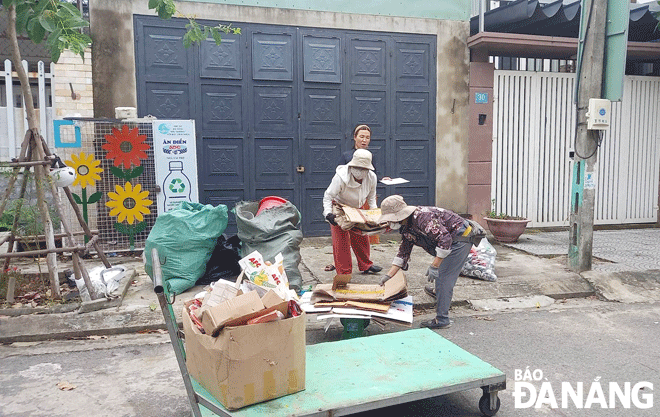Waste sorting at source in Da Nang on right track
After nearly 4 years of implementing the Da Nang administration’s adopted resolution on domestic solid waste management in the city, despite facing many difficulties, waste sorting at source is being implemented widely and staying in the right direction by relevant agencies.
 |
| Women's members of An Hai Bac Ward in Son Tra District collect resource waste after sorting waste at households. Photo: HOANG HIEP |
Maintaining recyclable garbage collection
Over the past time, local competent agencies have actively implemented waste sorting at source, especially maintaining regular collection of recyclable waste such as plastic, metal and paper after the sorting process at households, businesses and organisations for more effective promote garbage classification.
Typically, from October 18 to 24, women in An Hai Bac Ward, Son Tra District collected a variety of resource wastes after being sorted out at households and then earned VND4.12 million from sales to raise funds for local social welfare programmes in residential areas.
The amount of money collected from recyclable waste each week is currently on average from VND4-5 million /week, a high increase compared to mid-2022 with VND2-3 million/week). The frequency of resource garbage collection also increases once a week compared to the beginning of 2022, every 10-15 days.
In an active response to the campaign to make the world cleaner in 2022 launched by the United Nations in the 3rd week of September on a global scale, the women's associations in villages in Hoa Son Commune, Hoa Vang District collected 68kg of plastic, 120kg of metal and 32kg of paper, all of which were sold at a total of VND 4.3 million to raise funds for local social welfare programmes.
As reported by Deputy Head of the Department of Natural Resources and Environment of Hoa Vang District Huynh Tan Bon, residents in all 113 villages in the district have actively engaged in separating recyclable waste from domestic trash. Also, many people have encouraged to implement models of composting, creating cleaning products from organic waste and recycling and reusing inorganic wastes, contributing to reducing the volume garbage transported to the Khanh Son landfill.
Vice Chairman of Hai Chau District People's Committee Nguyen Van Duy excitedly shared, “Local authorities, associations and unions have set up garbage collection cages and bins interestingly named the ‘Green Roof’ and ‘Battery house’ models in residential areas, contributing to the efficiency of waste separation at source.
Preliminary statistics in Hai Chau District show that, over the past time, 800 tonnes of recyclable waste, nearly 1 tonne of hazardous waste, 1,000 tonnes of construction waste have been collected for treatment.
Towards garbage sorting according to the Law on Environmental Protection
The 2020 Law on Environmental Protection prescribes volume-based fees on collecting, transporting and treating domestic solid waste.
This is an amendment of the new law, requiring households and individuals to sort their domestic waste into three groups: recyclable, food, and others.
The amended law also stipulates that domestic solid waste which has been recycled is not subject to waste collection, transportation and treatment fees
Food waste and waste classified as other types must be put in packages and transferred to treatment establishments.
Provincial People's Committees have the right to determine the fees, while the unit that collects and transports solid waste each day has the right to refuse to collect and transport the waste of households and individuals that is not sorted, according to the new law.
Detailed plans for waste sorting at source and volume-based waste collection must be completed by local authorities no later than December 31, 2024.
In order to promote waste sorting at source according to the provisions of the Law on Environmental Protection 2020, according to local experts, each household, resident, production, business and service establishment should raise awareness of waste sorting, especially food waste classification.
At the same time, it is necessary to make a large and synchronous investment sources in related technical infrastructure as well as points for collection, storage and transportation as well as mobilise more resources to participate in waste recycling and reuse;.
In addition, heed will be paid to strengthening inspection and the handling of administrative violations in cases of failure to sort garbage according to the regulations.
According to Deputy Director of Environmental Protection Division of the Department of Natural Resources and the Environment Nguyen Thi Kim Ha, the city has chosen a solution to classify garbage in accordance with the capacity and situation of the city, with the first group of garbage being classified as recyclable and reusable (or collectively referred to as resource waste), including plastic, metal and paper.
It is known that Da Nang is moving in the right direction in sorting waste at source. By 2025, the city will have completed foundations for the synchronous implementation of waste classification in accordance with the Law on Environmental Protection in 2020”, said Ms. Ha.
Reporting by HOANG HIEP - Translating by A.THU